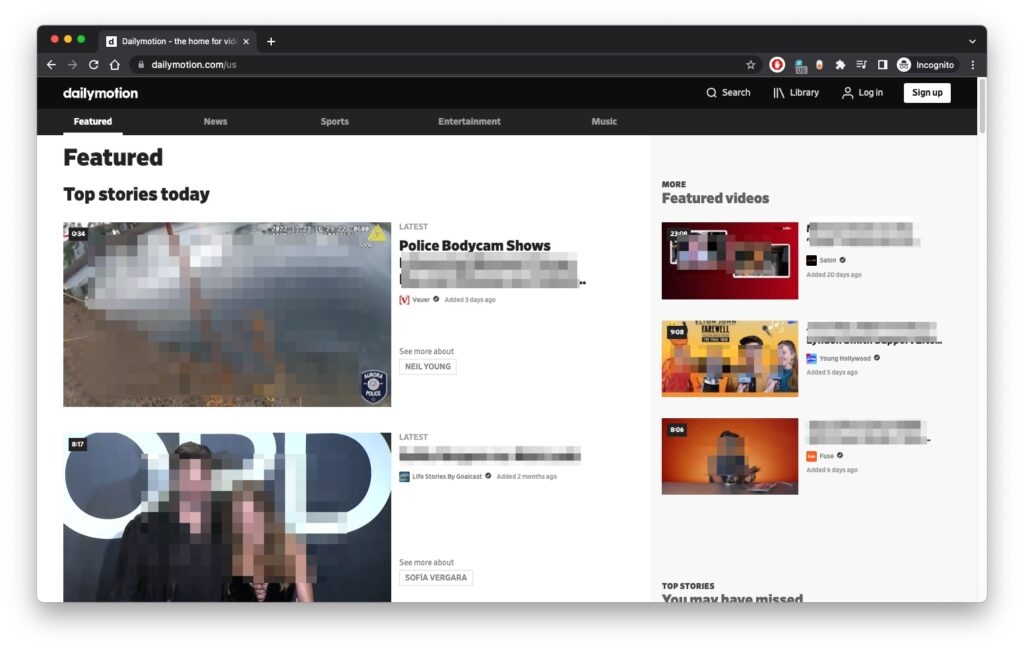Dailymotion has carved out a niche for itself in the world of online video sharing. Founded in 2005 in France, this platform allows users to upload, share, and view videos. With millions of monthly visitors, it has become a significant competitor to the likes of YouTube. As a multimedia platform, it hosts a myriad of content ranging from user-generated videos to professional productions, attracting diverse audiences around the globe. But what makes Dailymotion particularly appealing in Canada? Let’s dive deep!
For Canadians, Dailymotion serves as an accessible way to enjoy content without the geographic limitations often imposed by other platforms. Its user-friendly interface and strong community focus resonate well with users, allowing them to discover new channels and trends seamlessly. Here are a few reasons contributing to its popularity:
- Diverse Content: Unlike some platforms, Dailymotion supports a wide range of genres, including music, gaming, news, and original series.
- Easy Sharing: Users can effortlessly share videos across social media platforms, enhancing engagement and outreach.
- High-Quality Streams: Dailymotion offers various video resolutions, including HD, which is a plus for users who prioritize quality.
- Localized Content: The platform often features content tailored to specific regions, appealing to local tastes and interests.
With features that cater to both casual viewers and content creators, Dailymotion has solidified its place in the digital landscape of Canada. But as with any streaming service, it’s essential to understand the legalities involved to enjoy it responsibly.
Canadian Copyright Laws and Their Impact on Streaming Services

To grasp the legality of Dailymotion in Canada, we need to first understand the framework of Canadian copyright laws. These laws are designed to protect the rights of creators while also promoting the distribution of creative works. The Copyright Act provides a balance between these two interests, but how does it apply to streaming services like Dailymotion?
Canadian copyright laws primarily focus on the following key points:
- Copyright Ownership: Creators automatically hold copyright on their original works. This includes videos, music, and other forms of content.
- Fair Dealing: This provision allows limited use of copyrighted material without permission, provided it’s for purposes like research, private study, criticism, or news reporting.
- Digital Rights Management: The law protects the technological measures copyright owners use to safeguard their works.
- Liability of Platforms: Websites hosting user-generated content may be held liable for copyright infringement if they do not act on infringement notices.
Considering these points, several implications arise for streaming services like Dailymotion:
- Dailymotion must take proactive steps to filter out copyrighted material uploaded without authorization.
- The platform should have clear mechanisms for copyright holders to report infringements.
- When content is flagged under fair dealing, Dailymotion may still need to conduct assessments to determine if the usage is indeed fair.
Overall, Canadian copyright laws significantly influence how Dailymotion operates within Canada. It’s crucial for both the platform and its users to stay informed about these regulations to foster a safe and legal streaming environment.
Also Read This: Tutorial for Taping a Tennis Ball for Cricket with Dailymotion Videos
Legal Status of Dailymotion in Canada

When it comes to the legal status of Dailymotion in Canada, things can get a bit intricate. Dailymotion is a video-sharing platform, much like YouTube, and it operates under a specific legal framework that governs online content. While the platform is accessible in Canada, several factors outline its legal standing.
First off, Dailymotion complies with Canadian laws regarding copyright and intellectual property. The Canadian Copyright Act protects creators' rights, meaning that any user-generated content uploaded on Dailymotion must adhere to copyright laws. If a user uploads content that infringes on someone's copyright, both the uploader and the platform may be held accountable.
*Key Points Regarding Legal Status:
- Dailymotion operates under international law, which includes various treaties for copyright protection.
- The company must respond to "notice and takedown" requests when copyright infringement is reported.
- Users found violating copyright laws may face legal repercussions, including potential fines or lawsuits.
In addition, the platform is also subject to Canadian broadcasting regulations set forth by the Canadian Radio-television and Telecommunications Commission (CRTC). This aspect becomes especially relevant if the content strays into broadcasting territory, such as live events or significant television programming.
Overall, while Dailymotion functions legally within Canada, users should be aware of the implications of their content and how it aligns with national laws.
Also Read This: How Pepsi Is Made: Behind-the-Scenes Videos on Dailymotion
User Responsibilities When Accessing Dailymotion

As a user of Dailymotion, it's essential to understand your responsibilities when accessing and contributing content to the platform. The digital landscape is vast, and with that comes the responsibility to act ethically and within the bounds of the law.
Here are some user responsibilities you should keep in mind*:
- Respect Copyright: Always ensure that the videos you upload do not violate copyright laws. If you’re using third-party content, seek permission or use royalty-free materials.
- Community Guidelines: Familiarize yourself with Dailymotion’s community guidelines. Abide by the rules regarding hate speech, bullying, and explicit content.
- Report Infringement: If you notice content that violates copyright or is harmful, don't hesitate to report it. This not only protects you but also helps maintain a healthy community.
- Privacy Protection: Be aware of privacy issues. Don’t upload content that invades someone’s personal space without their consent.
- Age Restrictions: If you’re underage, verify that you're allowed to use the platform. Dailymotion has specific policies aimed at protecting minors.
Essentially, accessing Dailymotion is not just about enjoying entertainment; it comes with a responsibility to foster a respectful and lawful online environment. By following these guidelines, you contribute to making Dailymotion a safe space for everyone!
Also Read This: How to Build 6-Pack Abs in the Gym: A Complete Guide from Dailymotion
Comparing Dailymotion with Other Streaming Platforms
When it comes to online streaming platforms, users have a plethora of options to choose from. Dailymotion, although not as popular as giants like YouTube, offers its own unique set of features that can cater to different audiences. Let's break down how Dailymotion stacks up against other well-known streaming platforms.
- Dailymotion vs. YouTube:
YouTube reigns supreme with a massive user base, abundant content, and monetization opportunities for creators. However, Dailymotion excels in its focus on premium content and showcases a more curated selection of videos. It also allows longer video uploads, which can be advantageous for creators posting in-depth content.
- Dailymotion vs. Vimeo:
While Vimeo is known for its high-quality videos and a community of professional creators, Dailymotion presents a more casual interaction environment. Vimeo’s subscription model can be a barrier for some, whereas Dailymotion allows free uploads and provides a venue for less-polished but entertaining video content.
- Dailymotion vs. Twitch:
Twitch is all about real-time streaming, particularly for gamers. Dailymotion, on the other hand, is more geared towards pre-recorded videos and is great for discovering new content at your leisure. If live interaction isn’t a priority, Dailymotion is a solid alternative.
In summary, Dailymotion may not have the sheer size of other platforms, but it stands strong with its unique offerings, making it a worthy rival in the vibrant online streaming space.
Conclusion: Navigating the Legal Landscape of Online Streaming
Navigating the legal landscape of online streaming can often feel like walking through a maze filled with twists and turns. Dailymotion, like many streaming platforms, operates under a set of guidelines and laws that help dictate what can or cannot be shared. Understanding these complexities is crucial for both users and content creators.
In Canada, the Canadian Radio-television and Telecommunications Commission (CRTC) plays a significant role in regulating online content. As a user:
- It's important to ensure that the content you're watching doesn't infringe on copyright laws.
- Users should be aware of any regional restrictions that may affect what they can access on Dailymotion.
For content creators, knowing these guidelines helps protect against unintentional copyright infringements. Here are a few tips:
- Always credit original sources when using someone else's content.
- If you create original content, consider registering your work to protect it legally.
Ultimately, while Dailymotion offers a fantastic platform for sharing and enjoying videos, it's essential to stay informed. The digital landscape is ever-evolving, and being aware of the legal framework can help navigate it effectively and responsibly.
 admin
admin








